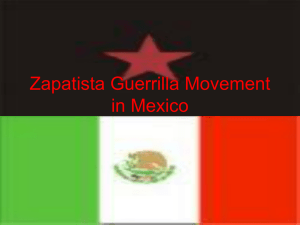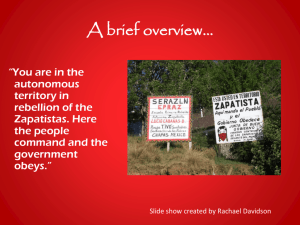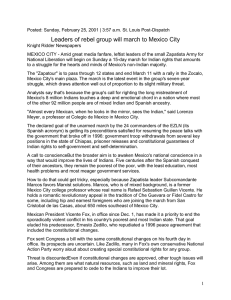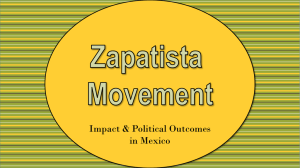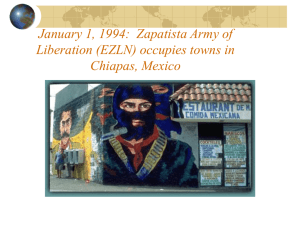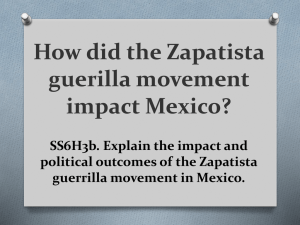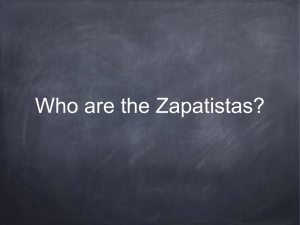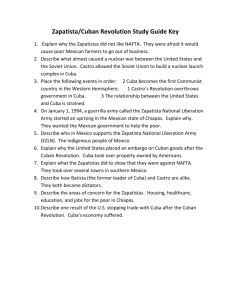Talks and History - Zapatista Rebels
advertisement
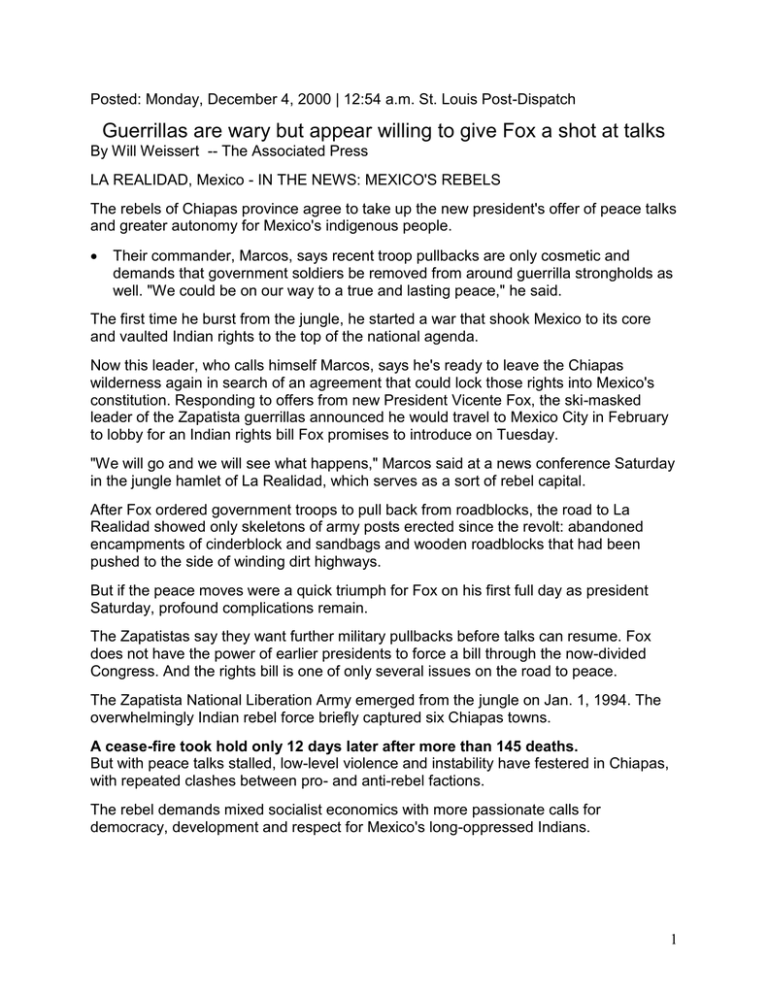
Posted: Monday, December 4, 2000 | 12:54 a.m. St. Louis Post-Dispatch Guerrillas are wary but appear willing to give Fox a shot at talks By Will Weissert -- The Associated Press LA REALIDAD, Mexico - IN THE NEWS: MEXICO'S REBELS The rebels of Chiapas province agree to take up the new president's offer of peace talks and greater autonomy for Mexico's indigenous people. Their commander, Marcos, says recent troop pullbacks are only cosmetic and demands that government soldiers be removed from around guerrilla strongholds as well. "We could be on our way to a true and lasting peace," he said. The first time he burst from the jungle, he started a war that shook Mexico to its core and vaulted Indian rights to the top of the national agenda. Now this leader, who calls himself Marcos, says he's ready to leave the Chiapas wilderness again in search of an agreement that could lock those rights into Mexico's constitution. Responding to offers from new President Vicente Fox, the ski-masked leader of the Zapatista guerrillas announced he would travel to Mexico City in February to lobby for an Indian rights bill Fox promises to introduce on Tuesday. "We will go and we will see what happens," Marcos said at a news conference Saturday in the jungle hamlet of La Realidad, which serves as a sort of rebel capital. After Fox ordered government troops to pull back from roadblocks, the road to La Realidad showed only skeletons of army posts erected since the revolt: abandoned encampments of cinderblock and sandbags and wooden roadblocks that had been pushed to the side of winding dirt highways. But if the peace moves were a quick triumph for Fox on his first full day as president Saturday, profound complications remain. The Zapatistas say they want further military pullbacks before talks can resume. Fox does not have the power of earlier presidents to force a bill through the now-divided Congress. And the rights bill is one of only several issues on the road to peace. The Zapatista National Liberation Army emerged from the jungle on Jan. 1, 1994. The overwhelmingly Indian rebel force briefly captured six Chiapas towns. A cease-fire took hold only 12 days later after more than 145 deaths. But with peace talks stalled, low-level violence and instability have festered in Chiapas, with repeated clashes between pro- and anti-rebel factions. The rebel demands mixed socialist economics with more passionate calls for democracy, development and respect for Mexico's long-oppressed Indians. 1 Deal fell through The only major peace agreement came in February 1996, when officials agreed to more autonomy for Indians nationwide. It was meant to be only one step toward a final accord. Congressmen drew up a bill to enact the accord. The Zapatistas quickly agreed. But President Ernesto Zedillo balked, saying it would create legal conflicts and endanger Mexico's sovereignty over its land and resources. The president's counterproposal was rejected by the Zapatistas. Fox's election July 2 - ending 71 years of single-party rule – itself seemed to answer the rebel demand for greater democracy in Mexico. Zedillo's party also lost Chiapas' governorship in elections in August. While campaigning, Fox quipped that he would like to sit down with Marcos and end the Chiapas revolt "in 15 minutes." And once in office, he moved quickly. Minutes after being sworn in, Fox urged Congress to adopt the Indian rights bill Zedillo had rejected. Within hours, his government ordered troops in Chiapas to abandon highway checkpoints and to start to pull back from encampments. Later, he welcomed Marcos' statements. "The Zapatistas have accepted dialogue. There's a new attitude, a new way of thinking," Fox said. "Let's have dialogue." Marcos said the pullbacks "do not modify the number of troops within the so-called zone of conflict" but said the Zapatista army "considers them a sign of better compromises to come." He demanded Fox also remove troops from around seven rebel strongholds. "We could be on our way to a true and lasting peace," said Marcos, speaking on a makeshift, open-air stage surrounded by bleachers of cut logs under a corrugated metal roof. He showed up with a customary AR-15 rifle strapped to his back and his trademark curved pipe between his lips. But he recalled that Zedillo had also promised a dialogue with the Zapatistas - "then launched a major offensive against us." Marcos has made several trips out of the jungle to cities in Chiapas state for negotiations with the government but has never openly left the state since the rebellion began. He said if there is peace, the Zapatistas would become a political organization, but not a party. Asked why, he quipped: "First of all, we'd lose." Posted: Monday, December 4, 2000 | 12:46 a.m. Key demands of Zapatista rebels The Associated Press 2 In order to return to peace talks with the government, the Zapatista National Liberation Army demands enactment of an Indian rights bill, the release of Zapatista prisoners and army withdrawal from positions in Zapatista strongholds. The rebels have made many, varied demands since they emerged on Jan. 1, 1994. Their major stated goals include: Expanded self-government for Indian communities and expanded role for Indians in national life. Overthrow of Mexico's single-party state (Vicente Fox in July defeated the party that had ruled Mexico for 71 years). Convention to draft new Mexican constitution. Continued redistribution and greater investment in farmland. Universal access to housing, health, food and jobs. End to authoritarian politics. Demilitarization of Chiapas state. Abandonment of market-dominated policies. Posted: Monday, December 4, 2000 | 12:44 a.m. Key events in Mexican rebellion The Associated Press 1994 Jan. 1: Zapatista National Liberation Army emerges from jungles in Chiapas state, seizing several towns to demand improved conditions and rights for Mexican Indians. Rebels retreat to jungle within days. Jan. 12: President Carlos Salinas declares cease-fire, ending open fighting after at least 145 deaths. Feb. 21: Peace talks start in San Cristobal de las Casas. Government makes peace offer after 10 days of talks. Zapatistas reject it in June. Aug. 21: Pro-Zapatista candidate loses Chiapas governor's race to the government's Institutional Revolutionary Party, or PRI. Zapatistas claim fraud. Oct. 8: Zapatistas suspend communication with government. Dec. 1: President Ernesto Zedillo enters office vowing to end the Zapatista revolt. Within weeks, accepts rebel demand for church-led mediation commission. 1995 3 Jan. 15: Rebel leader Marcos and Interior Secretary Esteban Moctezuma meet in Chiapas. Two days later, government orders army pullback. Feb. 8: Peace drive sours. Federal police find rebel arms in Mexico City and Veracruz and identify Marcos and other Zapatista leaders. Marcos is said to be Rafael Sebastian Guillen, a former university professor. Government orders his arrest. Feb. 9: Thousands of soldiers enter rebel territory for first time since uprising. Tens of thousands of rebel supporters flee. March 9: Law grants amnesty to Zapatistas to encourage peace talks. April 10: Negotiators in Chiapas jungle agree to resume peace talks. April 22: First round of talks begins in Chiapas town of San Andres Larrainzar. 1996 Feb. 16: Two sides sign "San Andres agreement" to expand Indian rights nationwide as a first step in peace pact. June 28: New Popular Revolutionary Army, or EPR, appears in Guerrero state. Group unrelated to Zapatistas. Aug. 28: At least 19 people die in EPR raids in four states. Sept. 2: Rebels announce withdrawal from peace talks; claim government reneging on San Andres agreement. Oct. 11: A Zapatista leader openly visits Mexico City for first time: Commander Ramona, seriously ill, comes for medical treatment. Dec. 6: Bill drafted by congressmen to enact San Andres agreement is accepted by rebels. Zedillo later says it must be modified to protect national sovereignty. Zapatistas reject government counterproposal. 1997 Dec. 22: Pro-government group kills 45 rebel sympathizers in Chiapas village of Acteal, the most dramatic of many continuing clashes linked to the rebellion. 2000 July 2: Vicente Fox defeats PRI in presidential election. Aug. 20: Coalition candidate Pablo Salazar defeats PRI for Chiapas governorship, vowing to eliminate anti-rebel paramilitary groups and work for peace. Dec. 1: Fox inaugurated. Promises to put San Andres rights bill to Congress and orders army pullback in Zapatista regions. Dec. 2: Zapatistas conditionally accept resumption of peace talks, announce plan to visit Mexico City. 4
